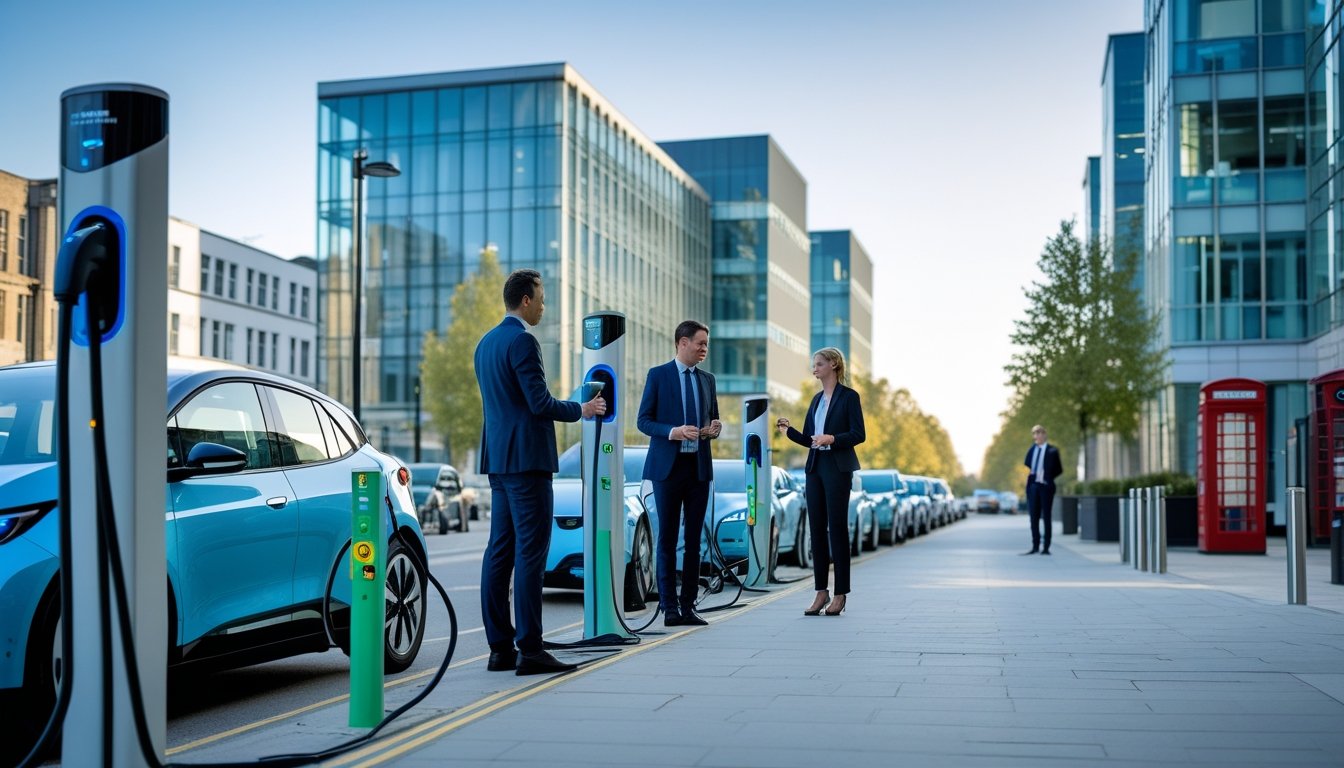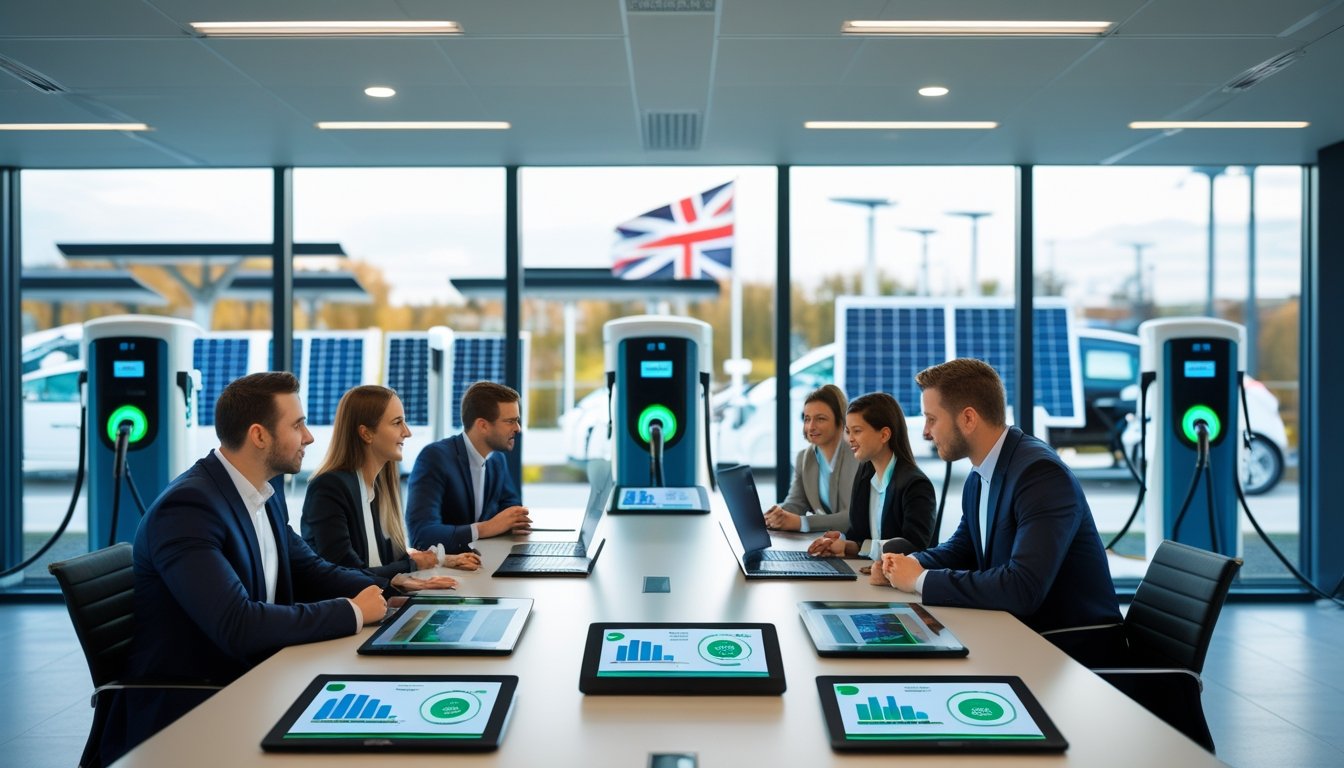Late updated: 03 Jul 2025 11:07
Written by: Amber Collins
Innovative EV Policy Changes For UK Businesses: Empowering the Future of Sustainable Transport
The landscape of the electric vehicle (EV) industry in the UK is rapidly evolving with significant policy changes that are reshaping the way businesses operate. In a bid to spearhead the global push towards a greener economy, the UK government has unveiled several initiatives designed to bolster the EV sector. These innovative policy changes promise to propel the UK to the forefront of the automotive transformation, making it a hub for sustainable transportation.

Key elements of these changes include the Zero Emission Vehicle (ZEV) Mandate, which aims to ease the transition for manufacturers as they shift to producing electric cars. By altering these requirements, there is an opportunity for businesses to innovate and adapt faster than ever. Additionally, there is a marked effort to expand and upgrade the EV charging infrastructure across the country, ensuring that there is sufficient support for widespread EV adoption.
To support businesses in navigating these policy shifts, it's important for industry leaders to stay informed and adapt strategies accordingly. Continuous investment in infrastructure and clear guidance from government initiatives will be critical in overcoming the uncertainties posed by shifting policies. The potential economic benefits signify a transformative period for the UK automotive industry, opening new avenues for growth and sustainability.
Key Takeaways
- Significant changes in EV policies are driving UK businesses toward innovation.
- Expanding infrastructure is crucial for smooth EV adoption.
- Staying informed helps businesses navigate these transformative policies.
Key Innovative EV Policy Changes Impacting UK Businesses

The UK is undergoing significant changes in electric vehicle policies, benefiting businesses committed to reducing carbon emissions. These reforms enhance the transition to zero-emission transport, reshape tax structures, and focus on consumer rights for EV users.
Zero-Emission Vehicle Mandate and EV Transition
The UK government has set ambitious goals for a zero-emission vehicle (ZEV) mandate, which accelerates the transition to electric mobility among businesses. Our push towards zero-emission vehicles not only reduces the carbon footprint but also aligns with the nation's net zero transition objectives. This mandate is particularly crucial for sectors like advanced manufacturing and logistics that rely on electric vans and fleet vehicles. By adhering to the ZEV mandate, UK businesses can contribute significantly to national decarbonisation targets. In doing so, they foster economic growth and encourage greater EV adoption, ensuring a sustainable future for the UK automotive sector.
Evolving EV Taxation and Incentives
The evolving taxation landscape offers various incentives to businesses investing in electric vehicles. Vehicle Excise Duty (VED) for EVs has been restructured to promote cleaner transport options. Benefit-in-Kind (BIK) rates offer tax advantages for employees utilising company-provided electric vehicles, boosting EV industry growth. Notably, VAT on public charging is under review to ensure fair pricing, which benefits both premium EVs and fleet operators. Progressive policies aim to reduce the expensive car supplement and adjust taxation frameworks to stimulate the transition to electric vehicles, encouraging businesses to upgrade their fleet while mitigating financial burdens.
Consumer Protection and Fair Access
Ensuring fair access and robust consumer protection for EV users is a priority. Programmes like FairCharge advocate for equitable pricing models, making electric vehicle usage more accessible. These initiatives address disparities in charging infrastructure, providing UK businesses with wider access to necessary resources. By implementing transparent guidelines, we protect consumer interests effectively, promoting trust and confidence in EV adoption. Businesses benefit from these consumer-focused policies by fostering strong relationships with customers and reinforcing their commitment to sustainable practices, thereby enhancing their reputation and market position.
Expanding and Upgrading EV Charging Infrastructure

Enhancing and extending EV charging infrastructure is critical for meeting the growing demand for electric vehicles. Focus areas include building comprehensive charging networks, improving grid stability through smart charging, innovating home and workplace charging solutions, and integrating renewable energy sources.
Charging Networks and Public Chargepoints
Efficient charging networks are essential for addressing range anxiety. Public chargepoints in urban and rural areas must be readily available to meet diverse user needs. By investing in widespread charging stations, both rapid and standard, we aim to ensure every EV owner can access a charge point within a reasonable distance.
Collaboration between government entities and private firms is vital in expanding these networks. This partnership can offer strategic locations, such as car parks and service areas, for EV charging points, making it easy for users to charge efficiently.
Smart Charging and Grid Stability
Smart charging infrastructure is the cornerstone of maintaining grid stability while EV adoption increases. By utilising technology that schedules charging during off-peak hours, we can optimise energy consumption and reduce strain on the grid.
Together with energy providers, we must promote dynamic pricing schemes that incentivise users to charge during ideal times. This approach not only aids in balancing the grid but also reduces charging costs for consumers. Through smart charging, we aim to save on expenses and contribute to a stable energy future.
Home and Workplace Charging Innovations
The rise of home charging solutions is crucial for user convenience and overall network load management. Home chargers should be easy to install and operate, encouraging individuals to charge vehicles overnight. This practice reduces peak demand and enhances grid reliability.
For workplaces, offering EV charge point installation services as part of employee benefits creates a convenient solution. Innovating flexible installation solutions, like modular systems, helps businesses accommodate EVs even in spaces without existing infrastructure. By focusing on home and workplace charging, we ease daily logistics and improve access for everyone.
Integrating Renewable Energy Solutions
Incorporating renewable energy sources into our charging network strategy is a priority. Solar panels and wind power can be integrated with EV infrastructure to bolster sustainability. By using on-site renewables, charging stations can reduce dependency on the grid and utilise clean energy.
It's crucial we explore synergies between solar power generation and charging needs. For instance, installing solar panels on rooftops of charging stations can supply clean energy directly to charging points. This integration supports our commitment to a low-carbon future and makes EV charging eco-friendly and efficient.
Frequently Asked Questions

We explore various aspects of the transition to electric vehicles in the UK, focusing on government incentives, mandates, and infrastructure developments that affect businesses. Businesses in the UK are navigating a series of policy changes designed to encourage a shift towards electric mobility.
What incentives are available for UK businesses transitioning to electric vehicles?
The UK government provides multiple incentives to facilitate the shift towards electric vehicles (EVs). These include grants for purchasing electric cars and vans and significant savings on Benefit-in-Kind (BiK) taxes. Businesses can also benefit from enhanced capital allowances, making the financial proposition attractive.
How will the ZEV mandate affect UK companies' fleet management?
The Zero Emission Vehicle (ZEV) mandate requires a certain percentage of new vehicle sales to be zero-emission. This affects fleet composition and management. Companies will need to adapt by integrating more electric options into their fleets to comply with new regulations while also taking advantage of government incentives.
What developments are being made in EV infrastructure to support UK businesses?
Significant investments are underway to enhance EV charging infrastructure across the UK. The focus is on installing rapid and ultra-rapid charging stations. This development supports businesses by ensuring reliable and convenient access to charging facilities, thus facilitating the transition to electric transport systems.
What are the key points of the 2030 EV mandate and how does it impact businesses in the UK?
By 2030, the sale of new petrol and diesel cars will be banned in the UK. This policy pushes businesses to plan for an electrified fleet, encouraging early adoption of EVs. Companies need to formulate strategies to replace traditional vehicles, aligning with future legal requirements and environmental goals.
What regulations has the UK government implemented for EV charging stations at workplaces?
The government mandates that new non-residential buildings with more than 10 parking spaces must have at least one charge point. Furthermore, existing workplaces may need adjustments to comply with emerging infrastructure standards and maximise benefits for employees and operations.
How will the government's electric vehicle policies influence company car choices after 2030?
Post-2030, with stricter emission requirements, businesses will likely lean towards electric cars for company fleets. Electric vehicles will become the logical choice, given policy pressures and advancements in vehicle technology, offering both operational efficiency and environmental benefits, leading to reduced carbon footprints.
